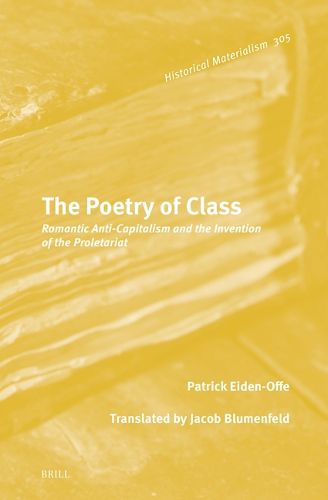Readings Newsletter
Become a Readings Member to make your shopping experience even easier.
Sign in or sign up for free!
You’re not far away from qualifying for FREE standard shipping within Australia
You’ve qualified for FREE standard shipping within Australia
The cart is loading…






In the early 19th century, a new social collective emerged out of impoverished artisans, urban rabble, wandering rural lower classes, bankrupt aristocrats and precarious intellectuals, one that would soon be called the proletariat. But this did not yet exist as a unified, homogeneous class with affiliated political parties. The motley appearance, the dreams and longings of these figures, torn from all economic certainties, found new forms of narration in romantic novellas, reportages, social-statistical studies, and monthly bulletins. But soon enough, these disorderly, violent, nostalgic, errant, and utopian figures were denigrated as reactionary and anarchic by the heads of the labour movement, since they did not fit into their grand linear vision of progress. In this book, Patrick Eiden-Offe tells their story, tracing the making of the proletariat in Voermarz Germany (1815-1848) through the writings of figures like Ludwig Tieck, Moses Hess, Wilhelm Weitling, Georg Weerth, Friedrich Engels, Louise Otto-Peters, Ernst Willkomm, and Georg Buechner, and in so doing, revealing a striking similarity to the disorderly classes of today.
$9.00 standard shipping within Australia
FREE standard shipping within Australia for orders over $100.00
Express & International shipping calculated at checkout
In the early 19th century, a new social collective emerged out of impoverished artisans, urban rabble, wandering rural lower classes, bankrupt aristocrats and precarious intellectuals, one that would soon be called the proletariat. But this did not yet exist as a unified, homogeneous class with affiliated political parties. The motley appearance, the dreams and longings of these figures, torn from all economic certainties, found new forms of narration in romantic novellas, reportages, social-statistical studies, and monthly bulletins. But soon enough, these disorderly, violent, nostalgic, errant, and utopian figures were denigrated as reactionary and anarchic by the heads of the labour movement, since they did not fit into their grand linear vision of progress. In this book, Patrick Eiden-Offe tells their story, tracing the making of the proletariat in Voermarz Germany (1815-1848) through the writings of figures like Ludwig Tieck, Moses Hess, Wilhelm Weitling, Georg Weerth, Friedrich Engels, Louise Otto-Peters, Ernst Willkomm, and Georg Buechner, and in so doing, revealing a striking similarity to the disorderly classes of today.